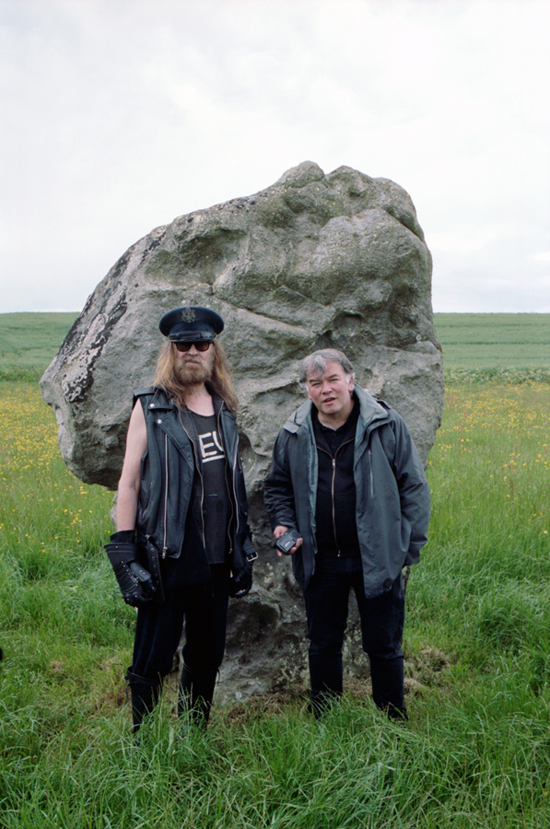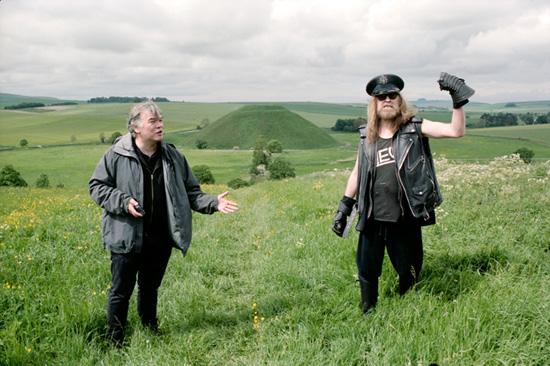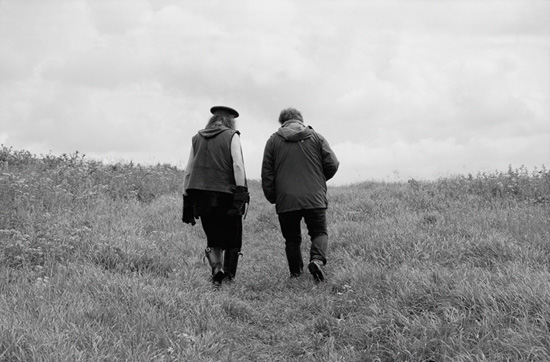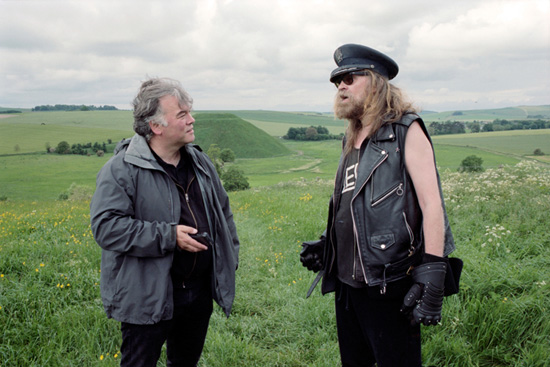All photography by Cat Stevens
Julian Cope’s first novel, 131, opens with its protagonist, a former rock star brilliantly named Rock Section, trapped in an aircraft toilet, covered in his own excrement. "Your novel begins at the point where many would end," I suggest. "Yes," agrees Cope, "it’s the same as ‘Like A Hurricane’ by Neil Young. Straight in with the lead guitar solo, no messing about. I consciously began the book with utter humiliation, his brown trousers all round his ankles. I thought, ‘Yes. The only way is up.’"
In his legendary solo performance piece The Furtive Nudist, the late shaman-clown and zen-ventriloquist Ken Campbell claimed he was able to move around the world entirely undressed and entirely unnoticed, because the last thing anyone was expecting to see was a naked man, and therefore passers-by just screened the image out of the collective consciousness. Likewise, as I move among the ancient standing stones of the Wiltshire village of Avebury early on a Tuesday morning in June in the company of local resident Julian Cope, who is dressed as a cross between an ’80s peace convoy anarchist and a WWII Nazi flying ace, what’s remarkable is not how much attention he draws, but how little.
"I can be lying in bed and then forty seconds later I am dressed," he rationalizes, from behind impenetrable shades, standing on a bank above the stone circle, as sheep bleat into my 1995 Sanyo TRC-570M Dictaphone behind him, "but small communities have room for a local figure like this. All the old guys round here that come and do building and plumbing for our house saw Hendrix in Bath in 1967 and they’ve all got a crush on him. They don’t see him as a guy, but as an exotic peacock creature. There’s always room for one fucker. Everyone’s got space in their hearts for one mad cunt." Cope could be describing the berdache, the sacred ‘man-woman’ of the Zuni people, allowed to stand both within and without the community, as well as describing himself. But which self is he describing?

Fifty-six year old psychedelic survivor Julian Cope has played many roles since he emerged, a nice lower middle class boy from Tamworth, Staffs, immersing himself into the nascent post-punk scene of late 70s Liverpool alongside Echo & The Bunnymen and the denizens of Eric’s. "Wylie, McCulloch and Pete Burns only had to fall out of bed and spend 8p and they were in Liverpool. It was their birthright. They were royalty as far I was concerned. I had only been into Tamworth."
Cope’s been the chart-topping early 80s pop pin-up of The Teardrop Explodes; the damaged Scott Walker/Syd Barrett hybrid of the early solo years; the shamanic shaven-headed eco-rocker of Peggy Suicide, Jehovakill, Autogeddon and 20 Mothers; and finally the definitive 21st century experimental cult artist, holed up in his Wiltshire fastness, self-releasing everything from the Viking Detroit pagan punk metal of Brain Donor to the Miles Davis meets Tangerine Dream drones of Queen Elizabeth, to the street-protest commune rock chants of Black Sheep, via the lysergic balladry of his solo records.
As a writer, Cope’s similarly versatile. His two volumes of memoirs were reliably entertaining dry runs for his more vital works; 1996’s Krautrocksampler critically rehabilitated dead-in-the-water German pre-punk and changed the sound of alterno-rock forever, long before the world wide web brought the forgotten past back within instant reach; 2007’s Japrocksampler did the same for the even more vilified and obscure sounds of 60s and 70s Japan; and the unlikely archaeological texts, the two hefty volumes of studies of prehistoric sacred sites, The Modern Antiquarian and The Megalithic European, sold ancient history to skeptics in the beat-prose of Lester Bangs and even aroused the interest of professional professors, when Cope posited the persuasive notion of stone circles as ur-rock & roll performance spaces, drawing on a personal experience denied to the dusty haired experts.
But now Cope comes to us in his most bewildering guise to date, that of the writer of the world’s first "time-shifting Gnostic hooligan road novel", 131, named after a Sardinian highway and published, no less, by TS Eliot’s heavyweight literary imprint, Faber and Fucking Faber! "Harper Collins was so massively corporate you could use voodoo on them. It was so hard to even have a meeting about The Modern Antiquarian so I was in control of the situation. But Faber is more intellectual. They want to be rock & roll but they can also invoke spirits of TS Eliot and Robert Graves."
Was the ‘literary novelist’ another of Cope’s off the peg guises? "I did go into character to write it," he confesses, "not as a novelist, but as an anti-novelist, because I figured no novelist would have been privileged enough to have lived such an extreme existence as I have. I had done things that a novelist would have to imagine."
If Cope ever sounds immodest, remember these self-aggrandising proclamations arrive from the mouth of a balloon-pantalooned biker Messerschmitt pilot standing in a sheep field. Context is not a myth. And Cope, the shaman-clown, has certainly stage managed set and setting this morning. He can be as arrogant as he likes, and he knows it, as long as he’s surrounded by sheep and dressed like a Black Metal Worzel.
Worrying about which experiences of Cope’s inform 131 quickly becomes a futile exercise, as facts and fiction interweave in a novel, conceptually and stylistically, unlike any other. An aging musical cult figure, DH Lawrence disciple and archaeology maven called Rock Section arrives in Sardinia in pre-soiled trousers to investigate the deaths of football hooligan friends he flew to the Island with way back in the 1990 world cup. They were apparently slain by Barry Herzog, a former DJ and promoter, who is now the figurehead of a quasi-fascist cult based on his prison writings, which are disproportionately, and accurately, hostile to Narnia-author CS Lewis.
Section is accompanied by his researcher Anna, whom Cope deftly avoids making into a standard love interest cipher, even though she and Section eventually become entangled. There’s not even any physical description of Anna’s actual appearance until about ¾ of the way through the book, Cope concentrating instead on her driving skills and archaeological knowledge. "That’s deliberate," he admits. "Rock Section is so cunted he doesn’t even notice her. He’s a former rock star. He’s not even interested in other people." The pair travel in a different culturally significant hire car every day as Rock Section takes a road trip to oblivion via a succession of prehistoric monuments, where he endures lengthy and illuminating past-life experiences as an early man in a pre-lapsarian wilderness.
Or at least I think that’s what happens. There were whole swathes of 131 where I couldn’t tell what was going on, which time stream we were in, or whether Rock Section was real or a past-life fantasy version of himself. But I didn’t care. Some of Cope’s digressions into ancient history, nationalist politics, and pop cultural ephemera were real, others imaginary, and some could have been either. (I know there was an early 70s Danish freak-folk band called Furekaben, but did they really soundtrack a Scandinavian exploitation biker movie? Was there an early 70s Sardinian cave-based proto-punk scene? Didn’t Jim Morrison die in Paris in 1971?)

Cope admits this confusion was a deliberate strategy. "My very useful and very intense literary agent Robert Kirby said "the way you write reminds me of Cervantes and Dante. You’ve got to get this book out fast." I demand of the reader to the point where they don’t know what’s real and what’s not real. I was very pragmatic about cultural references. I said, this is going to be like a road movie but the characters aren’t going to be driving in any car that isn’t incredibly symbolic. Even when stuck behind trash it will be post war Italian trash that means something."
Any anxieties about the literal sense of 131 are swept asunder by Cope’s audacious prose style, which carries the reader along on a wave of unrelenting energy. I read it in one sitting. If I stopped I felt I wouldn’t be able to get back on. The words were moving too fast. Like many of Cope’s musical endeavors, 131 plunders high and low culture, stealing from artists of accepted stature, and from those abandoned by the canon. Its less obvious debt is to (the now terminally unfashionable) DH Lawrence, with his brilliantly bombastic and heavily symbolic rants. Some of Anna and Rock Section’s psychiatrically self-knowing exchanges appear to be built brick by brick on similar scuffles in Women In Love or The Rainbow.
Cope’s interest in Lawrence as a character has been ongoing, though I couldn’t work out how many of Lawrence’s actual books, beyond the Sardinian travelogues, he had actually read. About seven years ago I encountered Cope by chance in the car park of a service station on the M4. He was on his way back from DH Lawrence’s childhood home in Eastwood, Nottinghamshire, where Lawrence set Sons And Lovers. "I’d been writing there. Lawrence fascinated me as the perfect vehicle for the character of Rock Section." Cope transposed Section from his own adolescence in Tamworth eastwards to the similar midland town of Nottingham. "I thought, "Great, you can rent Sons And Lovers cottage, so I went up there and realized Old Tamworth was like Eastwood, so I attached my own childhood onto Eastwood and had Rock Section come from there. Nottingham’s relationship to Liverpool was the same as Tamworth’s relationship to Birmingham. Tamworth was Birmingham overspill. I walked to school with Selwyn Brown, the keyboard player from Steel Pulse."
131 also has something of the flavour of the breathless blitzkrieg amphetamine deadline splurges of anonymous booze hacks knocking out accidentally experimental biker books and hippy sex and drug trash on their infinite monkey typewriters for the New English Library in the early 70s. Rock Section and pals’ battle against Italian football hooligans during Italia 90 shares the same brutal and immoral enjoyment of senseless violence as a Sven Hassel Nazi novel or a Robert E Howard barbarian brawl. "It took me so long to research it," Cope explains, "that I knew how it would work, following the route of the 131 etc, that when I finally went for it I knew it so well that I could just draw it down from the heavens."
Cope’s sentence structures collapse into rhythmic repetition and editorially suspect sub-clause clusters, three at one point all ending in the same three words, and all heroically deliberate. One section attempts to convey a character’s drugged confusion by repeating variations on the same three letters for five pages. The fool persists in his folly. He becomes wise. Likewise the eighty minute drones of Cope’s Queen Elizabeth records were a conscious choice. "Yes," he agrees, "I didn’t just stumble across a sound and then forget to turn it off. And I worked really hard on the cadences of the book, on the rhythms. That’s the musician part of me. People will get it who wish to get it but I don’t want to turn on tossers."
"It’s like Christianity," Cope says, brilliantly comparing his fiction debut with a major world religion of some 2000 years standing, "If you’re going to stand on street corners shouting you’re only going to pick up people who are utterly lost. I don’t want people attaching themselves to me who are lost. I want them to already be in some way on a trip. It’s demanding but great art is demanding. I really wanted to write something that people could complete themselves."

But who is equipped to review 131? It’s clearly set out what it intended to do, and it succeeds on its own terms, and there’s enough points where its experiments with conventional literary devices are successful enough for skeptical critics to concede that Cope can really write, but who is 131 for?
"It doesn’t do what 21st century fiction is supposed to do and I had no desire to do that or any respect to any lit conventions," Cope declares. As his Brain Donor project posited a kind of pre-civilisation rock & roll, so 131 could almost be described as pre-literary.
The Icelandic sagas are defined by an absence of the individual. There’s no first person narrator in any of them. But in 131 there are so many different Copes that, as he does via the many guises of his musical and literary careers, he almost becomes anonymous. 131 finds Cope engaged in a staged Socratic dialogue with various possible versions of his past and future selves.
Rock Section is a Cope gone wrong long term, his drug intake hampering his forward process rather than enhancing it; Judge Barry Herzog is the fascist Cope, the guru turned nasty, still surrounded by groupies into late middle age, and using his celebrity to spew hate; then there’s that other Cope, the stone-worshipping tribesman and son of Old Tüpp, that Rock Section meets in some visionary parallel world, which lost me if I’m honest. But I accept this may be my fault. Cope albums I didn’t click with as the deadline to file the review approached revealed themselves in full splendor months, years later. There’s a good reason last year’s Revolutionary Suicide opens with three dirges, and saves the good stuff to last, but at the time it just seemed like bad sequencing. Cope was making us work.
"I gave Judge Barry Herzog all the good lines," Cope confesses and in one sense he enjoyed being able to indulge in a playful silliness, via the mouths of his creations, that might sit ill with followers’ perceptions of Cope himself. One of Section’s street-poet acolytes has penned a piece called Knee My Wounded Heart At Bury, just one of many laugh out loud moments punctuating 131’s stream of consciousness narrative and dam-burst digressions on race, history, culture and drugs.
"People looking for versions of themselves might find themselves too," Cope reflects as we pose for photos in sight of the swelling mound of Silbury Hill. "What’s essential is that everybody in the book is a cunt. Of a kind. I stopped doing TV because I couldn’t hope to make sense in two minute sections. So instead I just became an utterly mysterious force. You complete projects. The most important thing is completing a project. I can’t make it better than this. It fucked me up to write a novel but surely it should. If you’ve got commitment, you can’t beat it."

A decade ago now, I interviewed Cope for The Sunday Times. He stood above me in his kitchen on a work surface, peering at me through sunglasses, and declaiming at me, as I sat below on a low stool, in a wonderfully staged piece of self-conscious theatre that I surrendered to unquestioningly. It feels like last week, to be honest, but at the time Cope said, "I know I’m not current, and I don’t believe I’m timeless. But I am in my forties, and I’m in sight of fifty. And once you’re over fifty, sixty’s not far away. And then you are allowed to be legendary. So I just have to keep my head down and keep working. And then I can be legendary."
"All morning," I admit to him, after what has been an in some ways frustrating attempt to pin Cope’s sparkling magpie mind down to explain his intentions with and hopes for 131, "I’ve been searching for what a paper would call the pull quote, some kind of pithy sentence that sums up what the piece is all about. I suppose that’s it, what you just said. "If you’ve got commitment you can’t beat it." That’s the bit they’d pull out, that’s what you could say about the book, both from the reader’s and the writer’s point of view." But I don’t know if Cope is listening. He’s already off towards the road, through the West Kennet stone avenue, talking about his next book, a manual for life which is to be called Pagan Defensive Driving. If anyone can write a book as good as that title, it’s Julian Cope.

(Ever the gnostic, Cope worked through the musical background of the novel by recording in the guises of the various imaginary musical entities mentioned in the book, from 70s Sardinian drone rockers that never were, to 90s novelty football rave anthems. A selection is available here, many free to download.)


